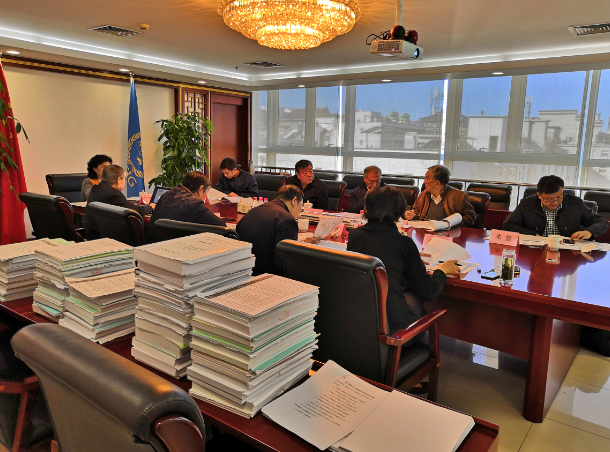On October 29, 2018, the Award Committee for the Third Distinguished Engineer Prize convened a plenary session to review the nominees for the Third Distinguished Engineer Prize.

The conference was chaired by Bai Keqin, the former chairman of the National People's Congress Education, Science, and Culture Committee and the director of the Distinguished Engineer Award Committee. Wu Hequan, a CAE Member and former vice president of the Chinese Academy of Engineering, served as the chairman of the Distinguished Engineer Award Review Committee. Wu Jichuan, the former minister of the Ministry of Information Industry and former vice chairman of the National People's Congress Education, Science, and Culture Committee, was also in attendance. Zhao Qinping, a CAE Member and former vice president of the China Association for Science and Technology and former minister of Education, also participated. Zhu Gaofeng, a CAE Member and former vice president of the Chinese Academy of Engineering and former minister of the Ministry of Post and Telecommunications, was present. Shi Dinghuan, a counselor to the State Council and former secretary general of the Ministry of Science and Technology, was also in attendance. Chen Xi, the chairman of ISEFC, attended along with Zhu Zhen, deputy director of the Suzhou High-speed Rail New City Economic Development Bureau, and Shu Shaolong, deputy director of the Suzhou High-speed Rail New City Technology and Business Bureau.
At the meeting, Mr. Ding Xuewei, the Deputy Secretary-General of ISEFC, provided an overview of the recommendations and review process for the third edition of the Distinguished Engineers Award. The selection process for this year's edition, which began on April 27, 2018, saw two key changes. Firstly, the award categories were revised. Instead of the traditional "Distinguished Engineer Award" and "Distinguished Engineer Encouragement Award," there are now 40 "Distinguished Engineer Awards" and 30 "Distinguished Young Engineer Awards." Recipients of the latter also receive monetary prizes, medals, and certificates, emphasizing the strong incentives for young engineers. Secondly, the application channels for private technology companies have been expanded, drawing four development zones as pilot locations to give special emphasis to these private enterprises.
The Chairman of the Distinguished Engineer Award Committee, Wu Hequan, gave a detailed introduction to the 40 candidates for the Distinguished Engineer Award. The selected individuals for this year's Distinguished Engineer Award have outstanding achievements in technological innovation and application, with many being renowned experts and leading figures in their respective industries. According to preliminary statistics, the 40 Outstanding Engineer Award candidates have collectively won 60 National Science and Technology Progress Awards and National Invention Awards, 151 Provincial and Ministerial Science and Technology Progress Awards and Invention Awards, and hold over 771 invention patents. In contrast, among the finalists for the Distinguished Young Scientist Award, those on the front lines of production stand out even more. Many young engineers have already played a pivotal role in important engineering and technical positions, undertaking significant management roles.
At the meeting, Director Chen Xi elaborated on the establishment of the Science and Technology Innovation Talent Contribution Award to the attending committee members. She highlighted that this award serves as an essential complement to the national talent cultivation initiative, aiming to encourage businesses to place greater emphasis on talent development and further refine their mechanisms. Moreover, it motivates enterprises to pay more attention to the recommendation and selection process for the Distinguished Engineer Award. The scope of this award encompasses companies that have made significant contributions to engineering and technical personnel training during the application process for the Distinguished Engineer Award. The target recipients are enterprises that have achieved outstanding performance in attracting, nurturing, and motivating engineering and technical professionals, fostering a conducive environment for talent growth. The primary objective is to guide businesses and various sectors of society in a pro-social manner to place more emphasis on the development and utilization of engineering and technical personnel, maximizing their innovative and creative vitality, and contributing to enhancing China's core competitiveness.
The attendees of the committee fully recognized the outstanding achievements made since the inception of the Distinguished Engineer Award, which has been increasingly recognized and celebrated by the entire society. By recognizing distinguished engineering and scientific professionals, this award has played a leading and exemplary role in promoting technological innovation across society, playing a significant role in stimulating innovation vitality in the production and construction sectors of our country. Furthermore, the committee members also emphasized that ISEFC should proactively and prudently carry out the awarding process, ensuring fairness and impartiality, fostering a positive selection environment, and expanding the influence and building a strong brand for the Distinguished Engineer Award.
The Award Committee has finally approved the list of recipients for the third edition of the Distinguished Engineers Award.
